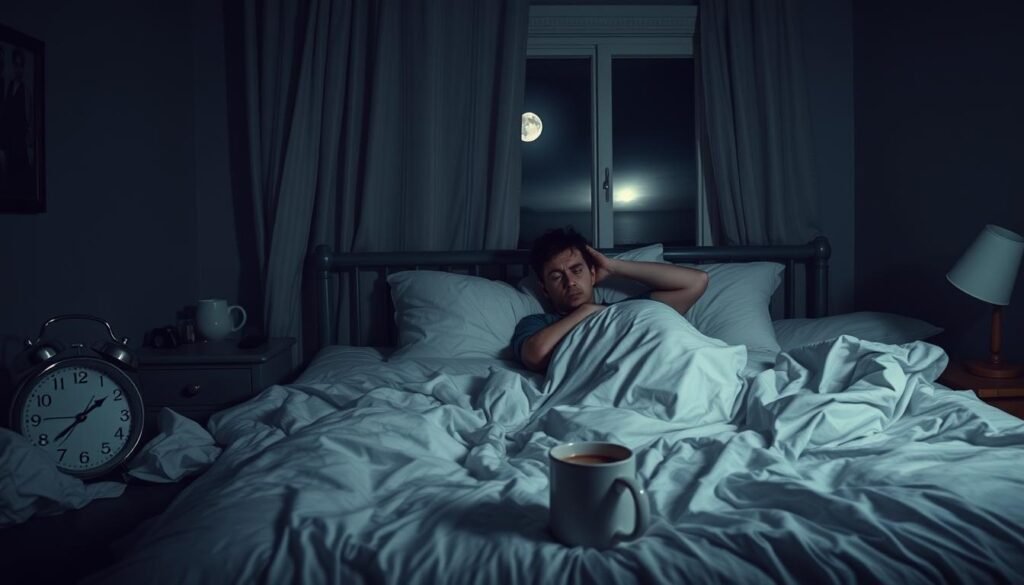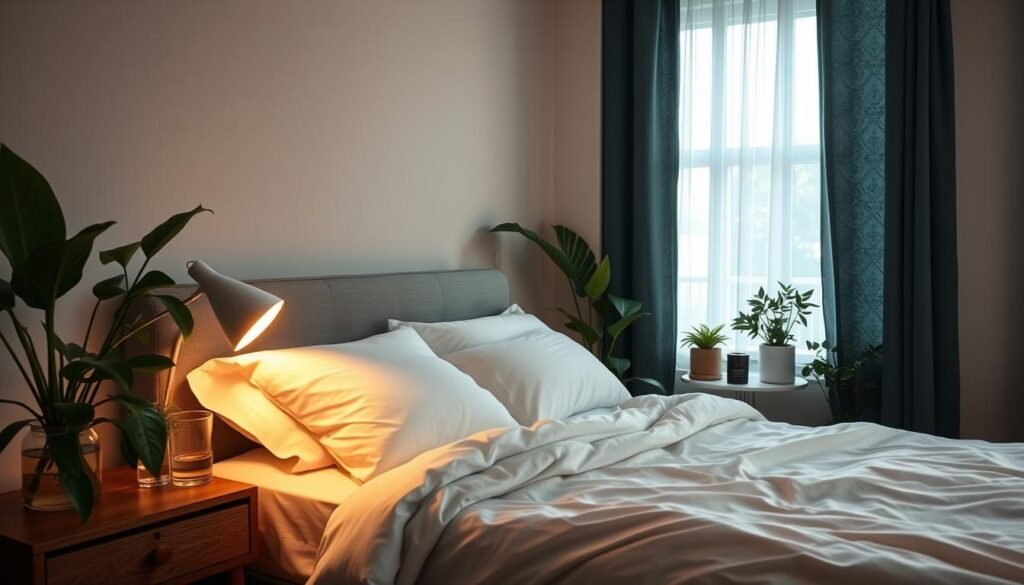About 30% of adults face insomnia symptoms at some time. Experts say adults need 7 or more hours of good sleep each night. Not sleeping enough can really affect your health and happiness. This guide talks about special ways to handle insomnia. It offers important tips on getting the right sleep therapy, including sleep plans made just for you.
Insomnia is more than just annoying. It leads to trouble falling asleep, waking up a lot, and being very tired during the day. Getting to know about this condition is key to finding relief. You might use Cognitive Behavioral Therapy for Insomnia (CBT-I) or improve your sleep space. These methods help you fight insomnia and get back to sleeping well.
Key Takeaways
- 30% of adults experience some form of insomnia during their lives.
- Effective solutions like CBT-I play a crucial role in managing insomnia.
- Personalized sleep plans cater to individual sleep needs and lifestyles.
- Culturally tailored interventions can significantly improve treatment engagement and outcomes.
- Physical and emotional symptoms of insomnia can affect daily life and productivity.
Understanding Insomnia and Its Types
Many people struggle with insomnia. It’s when you can’t sleep well, which can make your days harder. Knowing about insomnia helps us find good ways to fix it. Insomnia can be short-term or long-term, which changes how it’s treated.
Defining Insomnia
Insomnia comes in two types: acute and chronic. Acute insomnia is short, often caused by stress, and goes away by itself. It lasts less than three months. On the other hand, chronic insomnia lasts for a long time. It happens at least three nights a week for more than three months. This type usually needs more help to get better.
Acute vs. Chronic Insomnia
It’s important to know if insomnia is acute or chronic to treat it right. Acute insomnia happens because of specific events. Chronic insomnia is more about ongoing problems, like health issues. Knowing exactly what’s wrong can help find the best way to sleep better. For more information on insomnia and how to deal with it, check this resource.
Common Causes of Insomnia
Understanding the causes of insomnia is key to managing it. This disorder can come from psychological factors, environmental issues, and health problems. Knowing these causes helps create effective solutions to improve sleep.
Psychological Factors
Psychological factors are big in causing insomnia. Stress, anxiety, and depression lead to many cases. They are behind about half of them. Because chronic insomnia can also cause cognitive and mood problems, managing these psychological factors is crucial.
Environmental Influences
Environment can affect how well you sleep. Noise, light, and an uncomfortable room can make sleep hard. Creating a quiet, cozy place for sleep can help a lot. Also, avoiding big meals or drinks before bed prevents sleep troubles.
Medical Conditions and Medications
Health issues can cause insomnia too. Conditions like chronic pain, asthma, and diabetes can mess with sleep. Some medications, including those for blood pressure and depression, can disrupt sleep. Understanding how these affect sleep can help manage insomnia better.

| Category | Examples | Impact on Sleep |
|---|---|---|
| Psychological Factors | Stress, Anxiety, Depression | Difficulty initiating/mantaining sleep |
| Environmental Influences | Noise, Light, Uncomfortable bedding | Disrupted sleep continuity |
| Medical Conditions | Asthma, Arthritis, Chronic illness | Pain and discomfort leading to wakefulness |
| Medications | Antidepressants, Blood pressure drugs | Interference with sleep cycles |
Symptoms and Signs of Insomnia
Recognizing the signs of insomnia is key. It shows up through physical and emotional signs that impact daily life. Knowing these helps people get help sooner, which might lead to better outcomes.
Physical Symptoms
People with insomnia often have various physical complaints. These include:
- Fatigue and low energy levels
- Difficulty concentrating on tasks
- Frequent daytime sleepiness
- Memory lapses
- Unexplained aches and pains
Long-term insomnia can make these symptoms worse. This can hurt a person’s health and how well they do things.
Emotional Symptoms
Insomnia’s emotional signs are just as crucial. Affected individuals might feel:
- Irritability or frustration
- Mood swings
- Increased anxiety levels
- Feelings of hopelessness
- Difficulty coping with stress
These emotional signs can mess with daily life, relationships, and happiness. Spotting both physical and emotional signs is vital for handling the problem well.

Importance of Sleep Hygiene Techniques
Understanding sleep hygiene is key to beating insomnia. Good sleep hygiene improves sleep quality and overall health. By making your bedroom peaceful, keeping a steady sleep schedule, and avoiding caffeine, you can sleep better.
Creating a Relaxing Sleep Environment
To sleep well, your bedroom must be serene. Use dim lights, cozy bedding, and keep it cool for better sleep. Keep it quiet and free from gadgets. This makes your bedroom perfect for sleeping.
Establishing a Regular Sleep Schedule
Having a routine helps a lot with sleep. Go to bed and wake up at the same time every day. This sets your body’s clock and matches your natural sleep patterns. You’ll fall asleep faster and sleep better.
Avoiding Stimulants Before Bedtime
Stay away from caffeine and nicotine before bed. They can keep you awake. Also, cut back on screen time at night. The blue light from screens can mess with sleep hormones, making it tough to sleep.

Navigating Insomnia Treatment Strategies
There are many ways to treat insomnia, tailored to each person’s needs. One key method is cognitive behavioral therapy for insomnia. This program aims to improve sleep quality significantly.
Cognitive Behavioral Therapy for Insomnia (CBT-I)
Cognitive behavioral therapy for insomnia helps with sleep problems. It usually takes six to eight sessions to complete. CBT-I uses methods like sleep restriction therapy and stimulus control therapy.
Sleep restriction therapy cuts down time in bed to increase sleep drive and lessen daytime tiredness. Stimulus control therapy helps remove bad thoughts about the bedroom. It suggests leaving the bed if sleep doesn’t come within 15–20 minutes.
CBT-I also includes cognitive therapy to change negative beliefs about sleep. It teaches patients to think more positively, aiding better sleep. Studies show 70% to 80% of people with primary insomnia see improvement with CBT-I.
Use of Medications
Medication is another common way to manage insomnia. Drugs like zolpidem and eszopiclone are often used. Though they can be effective, there’s a risk of side effects and becoming tolerant.
Medications like benzodiazepines have been FDA-approved since the 1960s. However, it’s important to think carefully about long-term use.
In conclusion, tackling insomnia often involves both cognitive behavioral therapy and medications. This dual approach helps create personalized treatment, improving sleep and overall health.
| Treatment | Type | Duration | Effectiveness |
|---|---|---|---|
| Cognitive Behavioral Therapy for Insomnia (CBT-I) | Psychological | 6-8 sessions | 70%-80% improvement |
| Zolpidem | Medication | As prescribed | Effective for sleep-onset |
| Eszopiclone | Medication | As prescribed | Effective for sleep-maintenance |
| Suvorexant | Medication | As prescribed | Effective with caution |
Tailored Solutions for Managing Insomnia
Addressing insomnia means using a plan that suits you. It’s about finding the right ways to improve your sleep for good. By making sleep plans just for you and joining programs, sleep troubles can get better.
Personalized Sleep Plans
Personalized sleep plans look at your sleep habits and way of life. They consider what affects your sleep, like your daily routine. This way, the methods really fit what you need. Trying personalized sleep plans can make your sleep much better.
Sleep Optimization Programs
Joining sleep programs is key to tackling insomnia. They use proven methods, like cognitive-behavioral therapies, to fix harmful sleep thoughts and actions. These programs are on digital platforms, offering many tools. They’re designed to fit into your life, improving your sleep bit by bit.
| Feature | Personalized Sleep Plans | Sleep Optimization Programs |
|---|---|---|
| Flexibility | Highly customizable based on individual needs | Structured program with specific guidelines |
| Duration | Can vary based on personal progress | Typically set duration, e.g., 8 weeks |
| Approach | Focus on behavioral and environmental adjustments | Utilizes cognitive-behavioral therapy methods |
| Accessibility | Tailored for personal implementation | Often available through online platforms |
Using tailored solutions like personal plans and programs shows you’re serious about better sleep. These methods together help solve sleeping problems. They make your overall health and productivity better.
Natural Remedies for Better Sleep
Looking for natural ways to sleep better? Many people prefer not to use sleeping pills. Instead, they turn to herbs and mindfulness to make their sleep better.
Herbal Supplements and Their Benefits
Herbal supplements are great for sleep. Valerian root, known for its calming effects, is a favorite. Melatonin helps with sleep cycles and works well in supplement form. This is especially true for those who often wake up at night.
Lavender also improves sleep for people with insomnia. Warm milk and chamomile tea are traditional but their benefits aren’t proven. For tips on how diet affects sleep, check out this resource.
Mindfulness and Relaxation Techniques
Mindfulness helps reduce stress, which can make sleeping hard. Trying progressive muscle relaxation can relax your body for sleep. Visualizing calm scenes through guided imagery also helps.
Regular exercise, like aerobic activities, leads to deeper sleep. Writing down what you’re grateful for for 15 minutes lowers anxiety. This helps you fall asleep faster. These methods show that treating insomnia holistically works.
Role of Sleep Tracking Apps
Sleep tracking apps have become very popular. They help people with insomnia understand their sleep better. They provide insights that help improve sleep habits.
Benefits of Monitoring Sleep Patterns
Sleep apps offer many benefits:
- They make you aware of how well you sleep.
- They show trends affecting your sleep.
- They track how noise and light affect your sleep.
- They let you share data with doctors.
About 32.9% of sleep apps claim they are based on evidence. But only 15.8% had input from health professionals. Users should be careful choosing apps, since quality differs greatly. Only three out of 73 apps were tested with advanced sleep studies.
Popular Sleep Tracking Apps to Consider
Let’s look at some top sleep apps:
| App Name | Main Features | User Rating (out of 5) | Data Collection Method |
|---|---|---|---|
| Sleep Cycle | Smart alarm, sound analysis, snore detection | 4.6 | Automatic sensors |
| Sleep as Android | Sleep score, integration with wearables | 4.4 | Automatic sensors, manual input |
| Pillow | Sleep tracking, heart rate monitoring | 4.5 | Automatic sensors |
| Sleep Time | Sleep analysis with smart alarms | 4.0 | Automatic sensors |
| Relax Melodies | Soundscapes for relaxation, sleep timer | 4.7 | Manual input |
Sleep apps give a clear view of sleep patterns. But, users must think about data privacy. Since 67% of health app users prefer to stay anonymous, knowing about data sharing is crucial.
Conclusion
Dealing with insomnia takes understanding and effort. About 30% of people feel its effects, like tiredness during the day, fussiness, and a worse life quality. But, it’s key to know there is hope. Tailored plans can really help improve sleep.
Using good sleep strategies is important. One such method is Cognitive Behavioral Therapy for Insomnia (CBT-I). It targets the main causes of sleep problems and brings lasting benefits without medication side effects. Also, changes in lifestyle matter a lot. A calming sleep space and a steady sleep routine are vital. Trying different methods can help individuals find what works best for them, leading to better sleep.
On the journey to better sleep, keeping at it and knowing oneself are crucial. Using tested methods and realizing insomnia can be tackled with lifestyle adjustments and proven therapies gives hope. For more deep info on understanding and treating insomnia, check out this detailed guide. It offers insight into various treatment methods and their effectiveness.